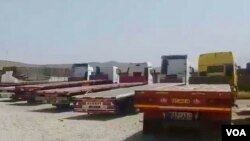Iranian truck drivers who have been on strike for 11 days to protest rising business costs have received new messages of support from prominent domestic and international transport workers’ groups.
In a statement published via social media Friday, an Iranian labor union representing bus company employees in Tehran said it supported the rights of the truck drivers and other transport workers to go on strike and stage protests for better working conditions. The Syndicate of Workers of Tehran and Suburbs Bus Company also said it condemned any assaults on workers exercising those rights.
The Iranian labor union, which posted the statement on its Telegram channel, said many of the striking truckers have been living below the poverty line because of meager wages. It also accused Iranian police of attacking some of the strikers since the labor protest began in several parts of the country on May 22.
Truckers report threats
Several striking truckers who spoke to VOA Persian in recent days said Iranian authorities had sent text messages threatening to revoke drivers’ licenses unless the strike ended. But there have been no verified reports of strikers being physically assaulted or detained.
Mobilized by social media, striking truck drivers have displayed signs complaining of stagnant wages as they face rising costs for insurance, road tolls, commissions, repairs and spare parts. The participation of gasoline tanker drivers in the strike has caused shortages at gas stations in some parts of the country.
Iranian activist reports dated Friday and verified by VOA Persian showed the truckers’ strike continuing in the port cities Bandar Abbas and Bandar Khomeini and in the provinces of Isfahan and Kermanshah.
International support
The strikers won additional support in a Thursday statement from the London-based International Transport Workers’ Federation (ITF), which represents 19 million workers in 140 countries.
ITF, whose members include the Tehran bus workers' union, said it stood “in full solidarity” with the Iranian truckers. It said the strike has had a significant impact on Iran because road transport is vital to the nation’s supply chains.
The statement quoted ITF head of inland transport Noel Coard as saying the truckers, together with most Iranians, have been suffering from the impact of ongoing inflation and price hikes in Iran.
“They can’t make a decent living,” Coard said. “At the same time, many trucks are in poor condition, needing spare parts and repairs. Alongside poor weather conditions, border area security problems and a general lack of road safety, Iranian truckers endure unacceptable working conditions.”
Coard also said respect for workers’ rights, including the right of independent trade unions to represent their members, was key to resolving the truckers' problems.
International rights groups say Iran has curtailed activities of labor unions in recent years, with some strikers being fired and union leaders being sentenced to long prison terms on national security charges.
Behrooz Samadbeygi of VOA’s Persian service contributed to this report.




